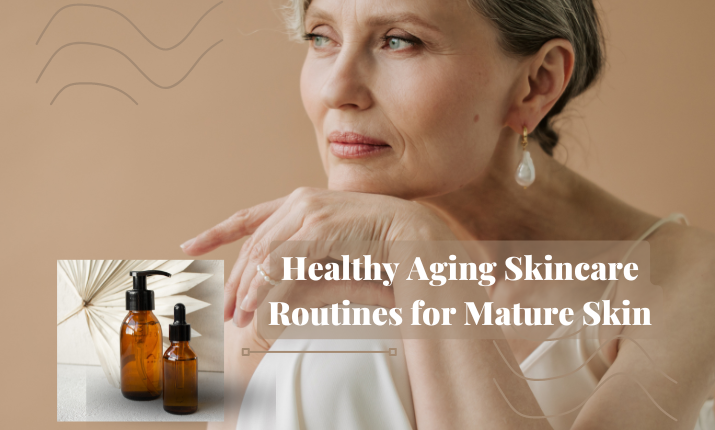Our skin experiences different changes as we age due to the combination of intrinsic factors (hormonal changes and genetics) and extrinsic causes (such as pollution, sun exposure, or lifestyle changes). The skin of mature age is often dry and less elastic. It is also more susceptible to age spots and wrinkles. However, a well-thought-out and planned skincare routine can dramatically improve the appearance and health of the skin. This article will examine effective skincare routines designed to mature skin, focusing on the importance of nourishment, hydration, and protection.
Understanding Mature Skin

Before you begin your skincare routine, you must know what constitutes mature skin. Most often, skin is aged around 40 years of age and up. The most important characteristics of skin that matures include:
- The production of collagen is reduced. Collagen is a structural component and elasticity. Its diminution can cause wrinkles and sagging.
- Low moisture levels: Mature skin often produces less natural oil, which can result in dryness.
- Sensitivity increases: Aging skin can be more sensitive to certain products and environmental influences.
- Color changes: Many people experience age spots or uneven skin tone with age.
Understanding these changes can lead to an approach targeted to skin care.
Building a Skincare Timetable for Mature Skin
A thorough skincare routine for mature skin usually consists of key steps: cleansing, exfoliating, toning and treating, moisturizing, and protecting. Let’s look at each step in greater detail.
Cleansing
What is it about? Cleansing removes dirt, makeup, and other impurities that may build up on the face throughout the day. For those with mature skin, using a mild cleansing cleanser that hydrates is vital.
Recommended products: Look for cream or oil-based cleaners that are sulfate-free. Ingredients such as glycerin and Hyaluronic Acid can help keep moisture in.
Schedule Tips: Cleanse your face twice daily, once in the morning and before bed. Avoid harsh scrubs, as they can be irritating to sensitive skin.
Exfoliating
Why it’s Important: Exfoliation helps remove dead skin cells and promotes cell turnover and a brighter complexion. However, mature skin requires a more gentle method to avoid irritation.
Recommended products: Opt for chemical exfoliants like alpha hydroxy acids (AHAs) or beta hydroxy acids (BHAs) instead of physical scrubs. Lactic and glycolic acids are excellent alternatives for encouraging skin renewal.
Schedule Tips: Exfoliate 1-2 times every week. Always follow this with a moisturizing cream or serum.
Toning
What’s the significance? Toners can help restore your skin’s pH and add an additional layer of water retention.
Recommended products: Look for alcohol-free toners that contain hydrating components such as aloe vera, rosewater, or hyaluronic acid.
Schedule TIP: Apply toner after cleansing and before applying any other product to prepare the skin for more effective absorption.
Treating
Why it is Important: This step is essential for focusing on specific issues, such as wrinkles, lines, or dark spots.
Recommended Products:
- Serums Pick serums containing active substances such as Vitamin C (for improving the appearance of your skin), Retinoids (for anti-aging), and peptides (for increasing collagen).
- Eye creams Eyes are delicate skin that often displays signs of aging. Look for eye creams containing caffeine, peptides, and hyaluronic acid.
Schedule Tips: For better absorption, apply serums and treatments when the skin is still slightly damp from the toner.
Moisturizing
What is it? An effective moisturizer can hydrate and benefit from locking in moisture, which prevents dryness and retains skin’s elasticity.
Recommended products: Look for rich, hydrating moisturizers with ingredients like ceramides, hyaluronic acid, and shea butter. Consider a lighter emollient that doesn’t feel heavy for use during the day.
Schedule Tips: Use a thicker moisturizer in the evening to prepare intense hydration as you rest.
Protecting
What is it? UV exposure is one of the main causes of premature wrinkles. Shielding your skin from damaging UV radiation is essential.
Recommended products: Use a broad-spectrum sunscreen with at least 30 SPF daily, even on cloudy days. Look for sunscreens with physical blockers like titanium dioxide or zinc oxide.
agenda TIP: Reapply sunscreen every two hours if you plan to spend long periods outside.
Additional Tips for Healthy Aging Skincare

Hydration
What is it? Drinking sufficient water ensures skin elasticity and youthful appearance and improves overall health.
Plan Tips: Aim for 8 glasses of water per day. In dry areas, you may also want to consider humidifiers.
Nutrition
Why it matters: A balanced diet with antioxidants may improve your skin’s health. Foods rich in vitamins C and E, omega-3 fatty acids, and polyphenols can help maintain skin health.
Agenda TIP: Incorporate plenty of fruits, whole grains, vegetables, and healthy fats into your daily diet.
Regular Dermatological Checkups
Why it’s Important: Regular visits to a dermatologist benefit detect changes in the skin and address any issues related to skin cancer, for example.
Schedule TIP: Schedule annual skin examinations and talk to your dermatologist about new or changing spots or moles.
Lifestyle Choices
Why it is Important: Lifestyle factors like drinking alcohol, smoking cigarettes, and sleep deprivation can have a negative impact on the health of your skin.
Agenda TIP: Aim for a balanced healthy lifestyle that includes regular exercise, enough sleep (7-9 hours each night), and stress-management methods like meditation or yoga.
Seasonal Adjustments
Your skincare routine may require changes based on the time of year. For example, you may need heavier creams to treat dryness in winter, while in summer, you may need lighter oil-free products. Take note of the way your skin reacts to various weather conditions.
Embracing Natural Remedies
You should consider including natural remedies in your daily routine alongside commercial products. Ingredients such as honey, aloe vera, and coconut oil may deliver extra nourishment and hydration. However, it is important to test any new ingredient to ensure no negative reactions.
Mindful Application Techniques
The way you apply your product will affect the way you apply your skincare routine. To prevent skin pulling, apply creams and serums with gentle upward strokes. You can incorporate massage techniques for the face to improve lymphatic drainage and circulation.
Conclusion
Age-related skin health can be achieved with a skincare routine tailored to your requirements. Concentrating on cleansing, exfoliating, toning treatment, moisturizing, and securing, you can maintain a glowing, youthful appearance. Remember that consistency is the key, and it’s never to take proper care of your complexion. You will be able to embrace the graceful aging process through a combination of good skincare, healthy lifestyle choices, and regular skin care.
FAQs
What are the most important elements of a skincare routine for skin that is getting older?
A skincare routine usually involves cleansing, exfoliating, toning, treatment, moisturizing, and securing (with sunblock). Each step is specifically designed to meet the particular requirements of mature skin.
When should I cleanse my aging skin?
Do a scrub 1-2 times weekly. Gentle, chemical exfoliants, such as AHAs and BHAs,, are usually advised over physical scrubs to prevent irritation.
What kind of cleanser is accurate for mature skin?
Find a gentle, hydrating cleanser that is sulfate-free and contains moisture-holding ingredients such as glycerin and Hyaluronic acid.
What can I do to increase the look of fine lines and wrinkles?
Add serums that contain retinoids and peptides in your routine because these ingredients can boost collagen production and the appearance of your skin.
Do you need to apply an eye cream that is separate?
Yes, it is true that the skin around your eyes is delicate and frequently is the first to show signs of age. Eye creams serve targeted moisturization in addition to the benefit of reducing dark circles and puffiness.
